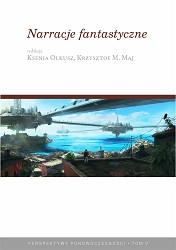Oniryczna kreacja zatopionego miasta w "Bestiarium" Tomasza Różyckiego
Oneiric Creation of Flooded City in Tomasz Różycki’s "Bestiarium"
Author(s): Elżbieta Pietluch
Subject(s): Language and Literature Studies, Studies of Literature, Polish Literature, Theory of Literature
Published by: Ośrodek Badawczy Facta Ficta
Keywords: poetry after 1989;Polish poetry after 1989;oniric experience;city;urban space;Tomasz Różycki;Bestiarium
Summary/Abstract: Elżbieta Pietluch’s chapter presents a reflection on the oniric creation of the sunken city in "Bestiarium"—the debut novel by Tomasz Różycki. There are various issues related to the city-theme in Różycki’s entire oeuvre that are the starting point for Elżbieta Pietluch’s further reflections. These reflections focus on the impact of postmemory on third-generation expatriate immigrants from Kresy. Postmemory is an original concept created by Marianne Hirsch. This term describes how the perception of the world depends on the traumatic stories spoken by ancestors. Intensive and traumatic memories and the perception of historical injustice incite an aversion to the city which is portrayed a culturally foreign place where the poet’s family feels out of place. The author of this chapter introduces three models for dealing with trauma. The third model reflects on a catastrophic vision of the destruction of the city presented in Różycki’s text. An opinion is presented stating that natural disaster is related to the mythological concept of the purge (Mircea Eliade) and the biblical account of Noah and the great flood. The deluge catastrophe is substanbtiated in the contemporary history of Opole (The Great Flood) and its interpretation is confirmed by the location and date of the events in the novel. Furthermore, the author introduces the category of the oneironaut who experiences lucid dreaming, hence the narrator of the story participates in the adventures interpreting situations of the absurd in a parallel world. In Paweł Huelle’s opinion the image of the city is similar to the organization of space in Bruno Schulz’s Sanatorium Under the Sign of the Hourglass. Różycki uses a surreal narrative in the construct of his plot. A city simultaneously located at the junction of the real and the imaginary and Różycki’s descriptions of a warped world filled with irony and the grotesque.
Book: Narracje fantastyczne
- Page Range: 423-435
- Page Count: 13
- Publication Year: 2017
- Language: Polish
- Content File-PDF

